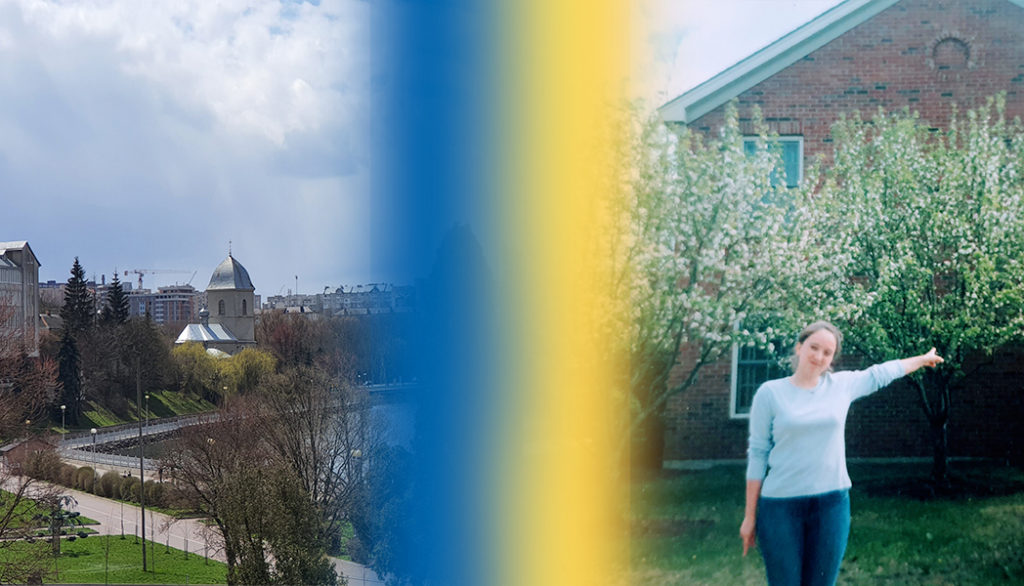
Left: City of Ternopil in Western Ukraine. Right: Olya Tymchak during her time at St. Michael’s.
Isabella Paredes | Social Media and Voices Editor | aparedesmend@mail.smcvt.edu
Twenty years ago, Olya Tymchak found herself in a 400s townhouse at St. Michael’s College living with other exchange students. She would attend literature and poetry classes with English Professor Greg Delanty, spend time with friends on Church Street, and occasionally ski in Stowe. Her dream to study abroad finally came true.
Now, she lives with her curtains closed and lights off in a dark apartment in western Ukraine, accustomed to anxiety caused by the blaring sounds of sirens.
Tymchak, 40, is a Ukrainian educator and English Language Teaching (ELT) consultant for a book publishing company. Tymchak was born and raised in Ternopil, a small city in western Ukraine. She lives in an apartment with her husband Taras and her 11-year-old son Mark. Tymchak lived in Crimea during the Russian invasion of 2014, and was forced to leave. She and her family then moved back to Ternopil.
Tymchak said that living through the invasion of Crimea felt like a movie. “I thought, ‘this is not real…. How can such a thing happen in our time and age?’” she said. Eight years later, the story repeats itself.
Although Ternopil has not experienced any direct attacks, Tymchak and her family still face the impact of war. During the first days of the invasion, Tymchak and her family went to the shelter at Mark’s school.
Now, she seeks safety in the basement of her building. “Here in my city, things are relatively peaceful,” she said. “But the news I see and the stories I hear from my friends are very scary,” she said.
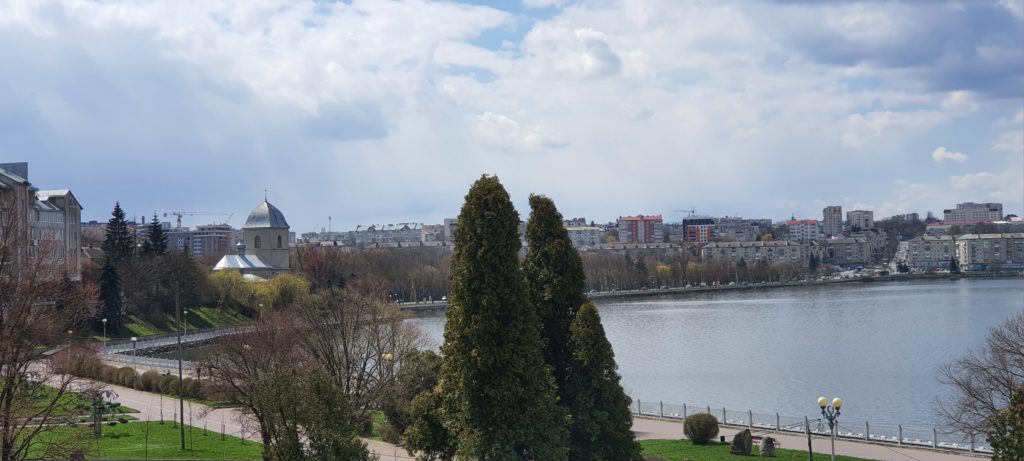
City of Ternopil.
It is not easy. For Tymchak, the nighttime is the most overwhelming. “You cannot fall asleep because of the uncertainty. You don’t know what is going to happen,” she said.
Tymchak had to explain the nerve wracking situation to Mark. “He did not want to stay in the shelter for long, and he wanted to go back home,” she said. “I am trying to find a simple way to talk to him about the dangers, explain to him why we are getting sirens, and what to do when we hear them.”
Mark has not attended school since the invasion started. On the week of March 14, he started online classes. He is in the fifth grade, and what were once days of learning in the classroom are now days at home studying in the dark.
“As a mother, I hope the children will be able to go back to school. I feel sorry that they have to be at home instead of class,” Tymchak said. “They are not seeing their friends, and some have already left. When they’ll come back, we are expecting lots of new children in the classrooms, because of the amount of internally displaced people in Ternopil,” she said.
The sound of the sirens haunt Tymchak and her family. Any loud sound now triggers an immediate response from Tymchak, making her hyper aware of her surroundings. Mark is on the autistim spectrum, which makes him experience higher sensitivity to sounds.
Particularly, the sound of sirens.
“Sometimes when I am studying with him, we hear the sirens, and we know we have to close everything. The electricity, the water, the gas in the apartment,” she said.
As a teenager, Tymchak would only hear sirens during drills. Now, it is a familiar and terrifying sound that is leaving a trace of fear in her. “Whenever I hear a loud sound, I think it is a siren. Because I am always anxious and worried, I think I hear sirens, when it is not happening in reality,” Tymchak said. She believes this is something that will resonate with her for a while. “Even when the war is over, I think I will carry this sound with me for some time… this hysterical sound…” she said.
Tymchak has experienced a range of emotions since the war began. “It came in waves,” she said. “At first, I was stuck. I could not really feel anything. I was not able to go outside. I could not even take a shower or brush my teeth. I could not eat. I had a couple of days of complete shock,” Tymchak said.
“Why does my country have to experience this?”
Tymchak had many questions, but no answers.
“Why does my country have to experience this? Why my people? Why are people being so cruel?” she asked herself. Then sadness took over. “I was crying all the time,” she said.
Eventually, Tymchak adjusted to her new reality. “Even though I understand it is not normal. I came to accept it more right now,” she said.
More than 4.2 million Ukrainian refugees have left the country since Feb. 24, according to the UN High Commissioner for Refugees (UNHCR).
Tymchak witnessed her friends and family flee the country. Some of her relatives moved to Poland. “I consider moving almost everyday,” she said. Despite it all, Tymchak hesitates to leave.
In order to help protect the country, the Ukrainian government has prohibited men aged 18-60 from leaving. Tymchak doesn’t want to leave her husband behind, so she agreed to stay.
Being together as a family makes Tymchak feel more at ease. After witnessing how families separate at the border, she doesn’t want to experience this pain.
“Men bring their wives and children to the border, and they say goodbye. Sometimes these men are going to war, so they don’t know if they will ever see their family again,” Tymchak said. Tymchak cannot imagine what it would be like to watch the news about Ukraine, knowing her husband is still there.
After the invasion, Tymchak received emails from friends asking about her wellbeing. One name in particular caught her eye– St. Michael’s English Professor Greg Delanty.
“It was great to hear from him after so many years,” she said. Delanty was her professor from 2002-2003 and she enjoyed his classes.
“When I was at St. Michael’s, I did not have a car, so it was hard for me to get places. Whenever we had to attend a poetry reading off-campus, Professor Delanty would give us a ride,” she said.
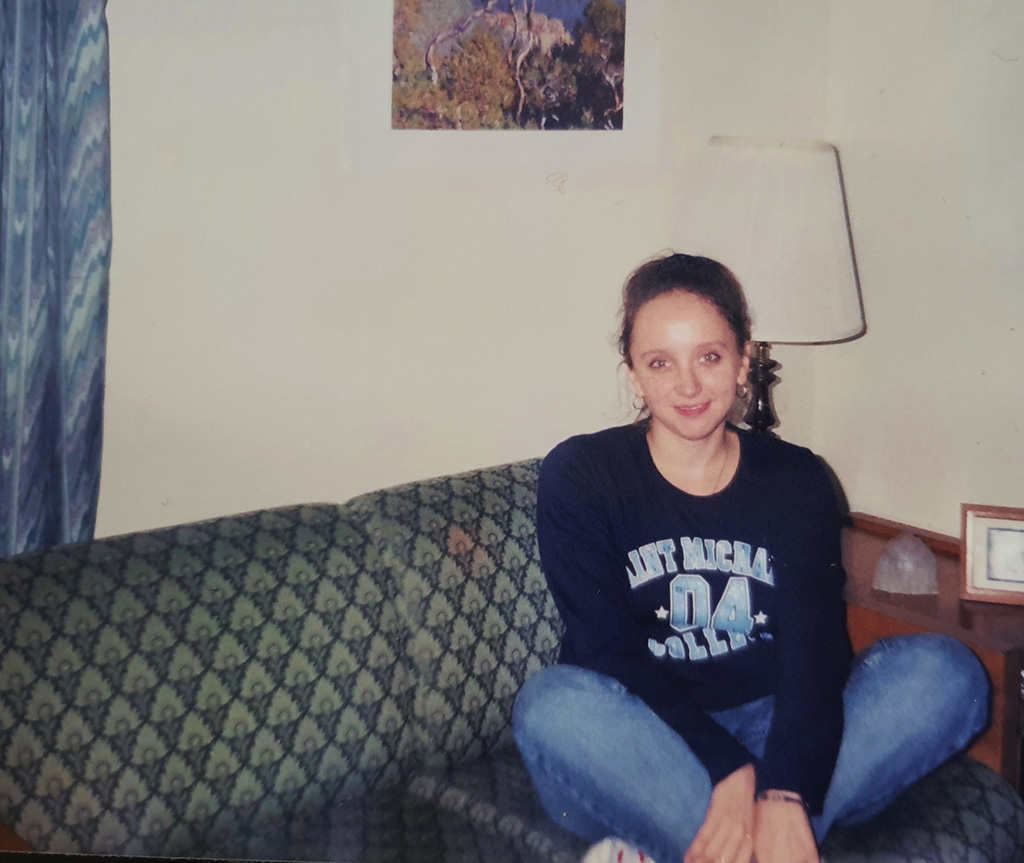
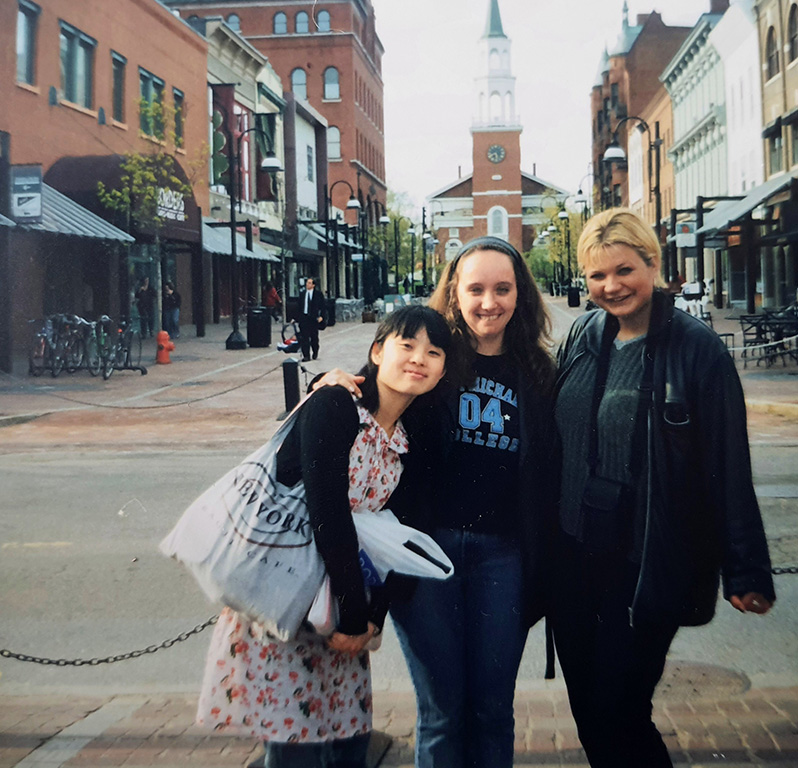
Left: Tymchak at her St. Michael’s townhouse. Right: Tymchak in Church street with friends.
Delanty remembers Tymchak as a great and passionate student.
“She was a pleasure to have in the class,” Delanty said. “I could read from her face that she was happy around literature,” he said.
Delanty describes Tymchak as a good writer, but most importantly, a good person. Her passion for literature and openness to learn were qualities Delanty admired.
“She is one of the best students I’ve ever had,” Delanty said.
Tymchak remembers taking an Irish poetry class with Delanty, a romantic poetry class with English Professor Christina Root, and a language and linguistics class with Professor Susan Jenkins, who is now retired.
“I cannot believe it has been 20 years… it feels like yesterday,” she said. She also remembers studying German, and enjoyed studying the language through English, rather than through her native language. “This American experience was truly an international experience. I really appreciated that,” she said.
Professor Richard Gamache, her academic advisor, remembers Tymchak as an excellent student. “A wonderful young woman who brought Ukraine to St. Michael’s. Having her as a student was a wonderful opportunity for our community,” he said. Gamache, who has been working with international students at St. Michael’s for fifty years, encourages students to have an international engagement experience.
“Global engagement is probably one of the most important experiences anyone can have,” he said. “Having the incredible opportunity to meet people that come from different backgrounds helps us to understand our world so much better. It is enriching,” he said.
“This affects everybody. We live in an interconnected world. If something happens in one part of the world, the whole world will also feel the effect.”
Despite the initial culture shock when she arrived in the United States, Tymchak found learning about cultural differences interesting. “It was a big change for me compared to Ukrainian education at that time,” Tymchak said. “Back at home, professors were not as warm with students. The attitude of students and professors in St. Michael’s was amazing,” she said. “It was my first time being abroad after such a long time. I really learned a lot from that,” she said.
Tymchak keeps good memories from her time at St. Michael’s as an exchange student. She was in her 20s, and received a scholarship from the U.S. State Department through the Freedom Support Act, an act to support freedom and open markets in the independent states of the former Soviet Union. While at St.Michael’s, Tymchak took classes concentrated in American Studies and literature.
These are not easy times for Tymchak. However, she is optimistic about the future. Currently, her biggest hope is for peace to come to Ukraine. She hopes that her country is able to restore, rebuild and rise. “We are hopeful this is going to end soon. I’m just afraid the cost will be so high. We don’t know exactly how many people are dead right now, and we do not know how many more will die,” she said.
She also hoped for her friends to come back and reunite with their families. “I want to stay here to see us grow,” she said. Tymchak believes staying positive and sticking together is essential to get through hard times.
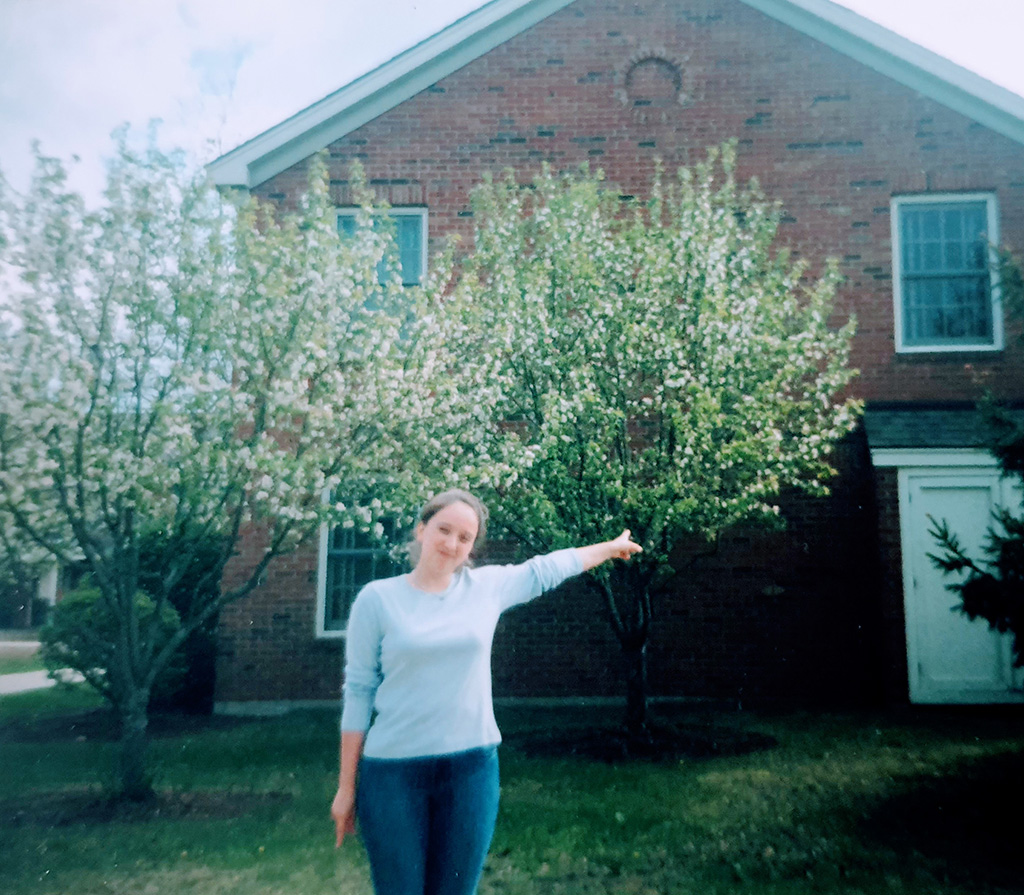
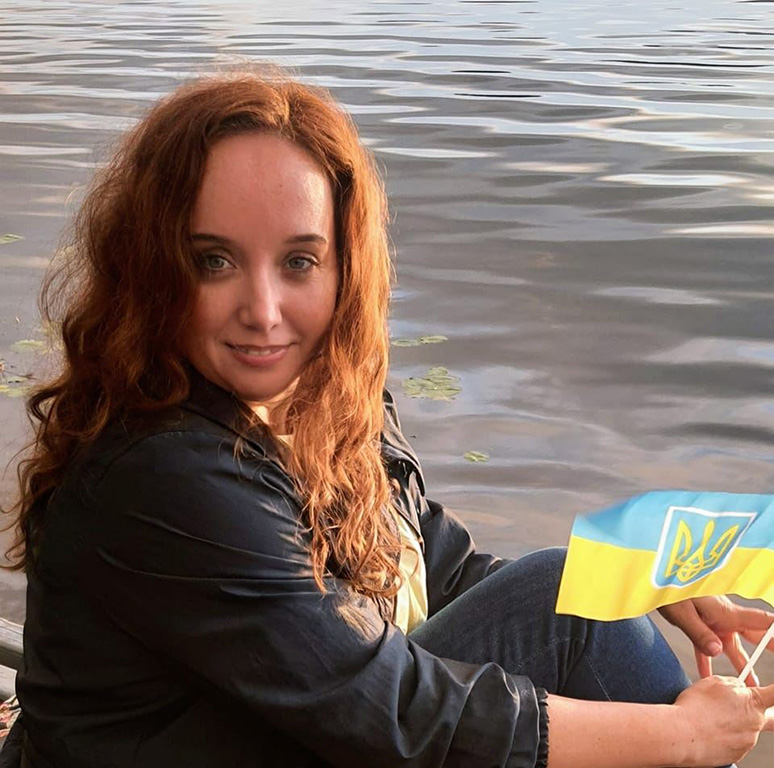
Left: Tymchak during her time at St. Michael’s. Right: Tymchak now.
“We are hopeful this is going to end soon”
Tymchak encourages people to support Ukraine by donating to aid organizations and attending rallies. “I am touched by all the support we get from other countries,” she said. She also highlighted that the effects of the Ukrainian crisis are not exclusive to the countries directly involved. “This affects everybody. We live in an interconnected world. If something happens in one part of the world, the whole world will also feel the effect,” she said.
In the future, Tymchak hopes to come back to Vermont and visit St. Michael’s. “I would really like to go back someday,” she said. “I want to see how things have changed.”
St. Michael’s still holds a special place in Tymchak’s heart. “I was dreaming about studying in the United States for years, and the dream finally came true at St. Mikes,” she said. Tymchak wanted to share her love with the St. Michael’s community, and remains thankful for the people she met during her time here.
“Keep up the good work. Continue educating people. Sending my love from Ukraine to all of you,” she said.

